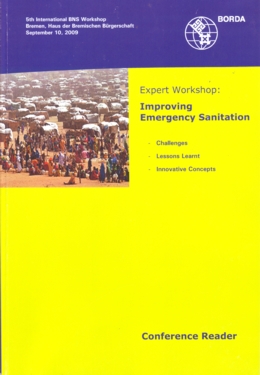 Considering recent numbers and frequencies of natural disasters such as earthquakes, floods andtyphoons, as well as humanitarian crisis caused by warfare – both leading to large numbers of displaced people – there is evidence that the number of displaced people living in semi-permanent shelters is on the rise. According to the UN, natural disasters affected 130 million people in 2008 and the number of refugees and displaced people increased by 14% to 9.9 million people in 2006.
However, for the majority of people living in emergency accommodations this is not a short but a longer lasting stay. It is estimated that about 80% of all camps and emergency accommodations are utilized more than one year with a barely minimum provision of basic sanitation infrastructure. While the supply of drinking water is often ensured during the early stages of interventions by international emergency agencies, unhygienic disposal of human excrements and faeces poses a continued challenge and threatens public health.
This becomes especially critical in larger and densely populated emergency settlements where a safe discharge of domestic wastewater beyond the settlement boundaries cannot be assured.
Synergies for emergency sanitation may evolve from development organizations working in the WatSan sector that have field-tested and demonstrated various dry and water-based on-site and decentralized sanitation systems successfully during the last decade (e.g. ECOSAN Dry Toilets, Community Sanitation Centres). Beside added value on the technical level, the ability of facilitating agencies to cope with the specific demands for sanitation infrastructure during natural disasters and human caused catastrophes is the key for successful improvements.
The objective of the expert workshop was to establish communication, facilitate professional exchange and initiate co-operations between sanitation practitioners and emergency sanitation agencies that ultimately may lead to improvements of sanitation services and public health within emergency settlements.
Content:
Background, Objectives and Leading Questions
Summary
Programme
Welcome Address
Introduction
Block 1. Challenges of Emergency Sanitation
Chris Buckley
Steven Sugden
Block 2. Conventional and Good Sanitation Practices for – Emergencies – Hands-on Experiences
Wilhelm Hensen
Tim Forster
Jorg Hauke
San Shwe Aung
Paul Shanahan
Jan Moldenhauer
Block 3. New Developments & Innovations in the Sector of Emergency Sanitation
Madeleine Fodge
Tency Baetens
Prawisti Ekasanti
Andreas Ulrich
List of Participants
Post Date : 26 Agustus 2010
|
